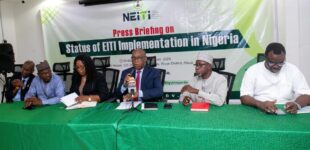Technology: The missing link in Nigeria’s development

I wish to thank the organisers of this Dokpesi @ 70 event for inviting me as guest speaker. I wish to congratulate Dr Raymond Dokpesi on the attainment of this landmark age. For the years ahead, I pray and wish him large doses of good health and happiness.
Distinguished ladies and gentlemen, I consider it an honour to share this platform with notable speakers and thank the organisers for the opportunity to be part of a gathering highlighting matters of far-reaching consequence to Nigeria.
One definition describes Technology simply as the application of scientific knowledge for practical purposes. Technology has been at the heart of the development of societies since the dawn of time. From the discovery of fire to the invention of the wheel; the internal combustion engine to electricity and the telephone; to the internet and the emerging areas of artificial intelligence; technology as you know, changes the way we interact, how we trade and do business, how we are entertained and how we understand the world around us.
That world is currently experiencing a period of intense innovation. Innovation driven by the digitisation of economies. Clearly, one of the lessons of history is that it is those nations that lead the development of new technology, or new thinking, that emerge as leaders in the world. They are nations that can harness developments in science and technology, and apply them to many of the social, economic and environmental challenges that face mankind.
In discussing the role that technology can play in driving Nigeria’s development, it is important to state that the nation has the talent and opportunity to become a leader in the development and the application of technology. Note that I have not said that technology is the missing link, because it may be correct to say that it is not completely missing in Nigeria.
Therefore, for the rest of my presentation I would like to modify the topic to read “Inadequate Technology Infrastructure: The Bane of Nigeria’s Development.” This will enable us to focus our minds on the problems that leave us lagging behind many other nations. Also because, probably embedded in the minds of the organisers of this lecture is a wish that immediate solutions would be found and put it in place timeously to accelerate the nation’s development.
Let’s consider some stats. The World Economic Forum report, 2011- 2012, in terms of the quality of overall infrastructure, ranked Nigeria at 125 out of 142 countries, with a value of 3.0 (1.3 below the mean value). In comparison, Cameroon was ranked at 122 and Ghana at 90. Regarding road quality, Nigeria was ranked at 120, with port infrastructure at 117, railroad quality at 104 and air transport quality at 104. Nigeria was also ranked at 139 out of 142 countries in terms of the quality of electricity supply, with a value of 1.5 (3.3 below the mean value). These rankings have remained largely unchanged as of 2020.
Critical infrastructures are foundational technology services, software, equipment, facilities, and structures upon which the capabilities of nations, cities and organizations are built.
I would like to expand on five main areas that could facilitate attainment of the desired development that the nation needs, namely, Technology Infrastructure for Education, Transportation, Energy/Power, Water and Communication.
Technology in Education.
According to the US Office of Educational Technology, the essential components of infrastructure capable of supporting transformational learning experiences, apart from physical buildings and associated furniture, include the following:
• Ubiquitous connectivity. Persistent access to high-speed Internet in and out of school
• Powerful learning devices. Access to mobile devices including computers that connect learners and educators to the vast resources of the Internet and facilitate communication and collaboration
• High-quality digital learning content. Digital learning content and tools that can be used to design and deliver engaging and relevant learning experiences
• Responsible Use Policies (RUPs). Guidelines to safeguard students and ensure that the infrastructure is used to support learning and not for nefarious pursuits.
Building a robust infrastructure for learning begins with an understanding of the goals and desired outcomes that support engaging and empowering learning experiences. When based on learning goals, technology infrastructure decisions become clear.
Preparing students to be successful for the future requires a robust and flexible learning infrastructure capable of supporting new types of engagement and providing ubiquitous access to the technology tools that allow students to create, design, and explore. This need became amplified in the wake of the COVID-19 pandemic last year.
We must therefore find ways to design, fund, acquire, and maintain the infrastructure that will make connectivity a reality for every teacher and every student in all learning environments.
Technology in transportation
Transportation infrastructure are foundational structures and systems for transporting people and goods. It is a complex network that connects urban, semi urban and rural areas for various human pursuits. Additionally, transportation networks contribute to socioeconomic development and increased quality of life through generating inter- or intra-city connections. Efficient transportation infrastructure is a critical factor for national economic development.
Traditional transport infrastructure includes roads, railways, airports, bridges, tunnels and waterways. Transportation infrastructure in Nigeria still leaves a lot to be desired. Most of inter-state and inter-city roads remain in disrepair. Employing modern technology in the roll-out of Road Transportation infrastructure to reduce traffic congestion and its associated costs will work better if the roads are in good condition.
For sensor-laden autonomous vehicles of the future, which will also communicate wirelessly with each other and to the wider internet of things to smoothen traffic flow, well planned and well-built roads are imperative. Secondly, large volumes of data transmitted by these technologies will require the high bandwidth and low latency of fifth generation (5G) wireless technology, as well as artificial intelligence that can analyze the data and anticipate future traffic risks for urban planners. (ref. Brookings Report on Smart transportation).
The federal government’s recent expansion of railway infrastructure including extending the rails to the seaports, is a move in the right direction. However, a lot still needs to be done. Some heavy revenue generating routes such as the direct east-west rail route must be done. Rail transportation remains the most dependable mode of transport compared to other modes of transport if well planned. It is economical, quicker and best suited for carrying heavy and bulky goods over long
distances. Although railway transport has many advantages, it suffers from certain serious limitations such as huge capital outlay and may be unsuitable for short distance and small loads.
Technology in energy/power
The energy sector encompasses the Oil and Gas as well as the Power subsectors. The huge contribution of down-stream Oil & Gas to national revenues and their potential to drive economic growth in the country, undoubtedly make it one of the most important sectors to Nigeria, because of its multiplier effect across all sectors of the economy. Nigeria however imports most of the fuel which it consumes, despite having large reserves of gas and oil. The current low average refining capacity of Nigeria’s four refineries in comparison to Nigeria’s needs for refined petroleum products for domestic uses, like cooking, powering machines and vehicles, etc. highlights some of the challenges in the sector; especially the need to increase capacity utilization of the refineries and improve maintenance culture generally. Things are however looking up with the Dangote refinery under construction and the planned rehabilitation of the Port Harcourt Refinery.
The effect of poor infrastructure is most evident in the Nigerian power sector where total output currently stands between 3,500 MW and 5,000 MW for a population of over 200 million people, as against South Africa with about 50 million people and a total power output at about 60,000MW, mostly from coal-fired power stations.
Public grid Electricity in Nigeria is generated from hydro, thermal power and, of recent, gas fired plants. Due to power shortages, the commercial and industrial sectors often depend on privately operated diesel- or gas- powered generators to self-supply electricity. Nigeria has in abundant supply of most of the energy sources (fossil fuels, hydro, solar, tidal, geothermal, and biomass) for power generation. If properly harnessedand deployed, they can meet the country’s energy needs and even generate export revenue. Currently, however, Nigeria’s per capita electricity generation is among the lowest in the world, limiting economic growth and productivity due to its negative impact on cost of doing business in practically all sectors of the economy.
To achieve the goals and objectives of the Energy sector, Nigeria needs to increase its investment in energy infrastructure. Perhaps the greatest need today will be accelerating the construction of gas pipeline infrastructure to deliver gas to the critical areas of need, especially the new NIPPs. Barring any setbacks, some EPC contracts awarded by NNPC in 2018 for 614km gas pipelines projects will help solve some of the problems when completed.
Technology in water
Nigerians derive their water from surface water, hand dug wells, rain harvesting, pipe borne water and boreholes. According to an independent study in 2009, approximately half of the population rely on shallow wells, which are vulnerable to contamination. Water supply therefore remains a significant problem in Nigeria. Difficulties include inadequate or non-existing water infrastructure, the contaminating effects of industry and the problematic nature of both the electricity supply (which can interfere with the proper functioning of water works) and the sanitation infrastructure.
It is technology that enables water from a river or sea to be purified and piped to far locations of human habitation. Technology will also be required for the metering of the water and billing of the users where desirable.
The water sub sector needs to be significantly revamped and upgraded.
Communication and information technology
Robust ICT networks are important for the economic growth of nations and constitute a base infrastructure that supports the world economy. It is vital for enhancing living standards and improving productivity and efficiency in other sectors. Thus, without communications and the technologies that support it, nations and businesses would become less competitive and lag behind others. It is the infrastructure of infrastructures.
The progress made in the policy and overall regulatory environment has been a key driver for enabling needed investment and expansion of ICT infrastructure in the country.
A number of Nigerians are involved in the technology revolution globally, and some of them are applying that capability here, to local challenges, and to local opportunities.
And some of the opportunities are truly game-changing. Look at the incredible strides our fintech ecosystem has taken over the last decade. Would any of us today have envisaged a start-up technology company exceeding the value of a commercial bank within five years of conception? But it is happening, and it is happening across multiple sectors.
Private capital has been attracted to the sector and with new innovative products continuously being introduced, the sector has become very vibrant and active and currently represents the sector with highest contribution to the national GDP.
Ladies and gentlemen, the Internet is a fundamental tool for the information age and together with other recent technological developments, has the potential to help bridge the development gap between the advanced and less advanced countries of the world.
The internet penetration in the country still remains limited in scope due to bottlenecks associated with right-of-way challenges at state and local government levels. There must therefore be a concerted effort by all to get everyone online and enable people to have access to communications infrastructure of one type or the other.
It is now time to call on political leaders and office holders to measure their success from how many of their citizens have access to high-speed broadband internet. Quoting from an ITU publication: “if information is power, then the internet must be the easiest way of empowering those that have traditionally been left behind.”
Strategic imperatives
To meet its current infrastructure needs in all sectors, Nigeria must aggressively increase investment and spending in infrastructure. This is especially challenging considering that other important sectors of the economy are also competing for the limited resources available to government. Additionally, maintenance costs will grow proportionately as infrastructure stock increases. This will obviously put additional pressure on Government budget if Infrastructure procurement and maintenance continues to go the route of full Government funding.
To achieve the desired infrastructure investment levels that will serve as the catalyst for Nigeria’s economic transformation, other financing arrangements other than Government budgetary provisions must continue to be explored and employed. Private sector participation in the provision of infrastructure is inevitable since it is clear that Governments alone cannot afford these huge financial costs.
Consequently, Public Private Partnerships (PPPs) have become the most widely used vehicle for accelerating sustainable infrastructure growth for socio-economic transformation of society both in the developed and developing economies. In Britain for example, the system was introduced in 1992 and since then several physical and social infrastructures have been developed through it. In Nigeria PPPs can help free up government’s limited capital budgets to focus on other key priorities, such as providing more basic health care, education, and social safety-net services to Nigerians.
Just 10 days ago, at the Mid-Term Ministerial Performance Review Retreat, Dr. Akinwumi Adesina, President of the African Development Bank Group, also reiterated that “Infrastructure is critical for unlocking the full potential of Nigeria’s economy” and that “Nigeria will need $15 billion a year for investment in infrastructure.”
PPPs have historically focused on physical infrastructure components. For example, the recent initiative for Road Infrastructure Tax Credits (RITC) for private sector investment in infrastructure is already yielding the desired results and a number of companies including MTN Nigeria have keyed into it. All efforts must be made to ensure that it is sustained.
PPPs are also increasingly being employed by governments around the world in key social sectors such as health, education, housing, sports facilities and even public safety and emergency services such as Prisons, police and fire services.
Conclusion
I was worried when I was writing this paper because many studies in the past have articulated what needed to be done as a country. The vision 20:2020 document which was launched in 2009 had envisaged that Nigeria would be one of the first 20 economies in the world by the year 2020. Why were the lofty ideals of this vision not achieved? An analyst, one Ayo Olukotun, in an article likened the audacious goal to a “beautiful architectural drawing that signaled the possibilities of utopia, bereft, however, of precise or significant steps towards laying a foundation, much less, building the proposed edifice”.
Also, in 2014 the Government of Nigeria requested the African Development Bank (AfDB) to prepare a report on the state of infrastructure in the country. The Bank accepted this request and produced the Flagship Report entitled, “An Infrastructure Action Plan for Nigeria: Closing the Infrastructure Gap and Accelerating Economic Transformation.” This was cognizant of the fact that, policy actions and investment in infrastructure have important roles to play in Nigeria’s economic transformation.
The big question therefore is why these and other brilliant plans have not been successfully implemented. Perhaps there are other factors that contribute negatively to Nigeria’s Development apart from inadequate Technology Infrastructure. One that immediately comes to mind is corruption. The second is the incompetence of the nation’s managers in critical leadership positions. I am not referring here to the elected officials because, it is only the voters that have the right to choose their leaders. I speak of those appointed to head various critical institutions and agencies. No one can give what he/she does not have. In Nigeria we appoint medical doctors/CMDs by quota, Vice Chancellors by state of origin, we select air force pilots by quota, even appoint science and mathematics teachers by quota.
We have witnessed tremendous successes whenever we have competent people manning sensitive and critical positions in the country. When we get it right with appointment of competent, bold and committed manpower, our development plans would have better chances of being successfully executed.
Distinguished ladies and gentlemen, in closing, I will be right in stating that nearly everyone in this hall will agree that we have serious technology infrastructure deficit in Nigeria which is negatively affecting our pace of development as a nation. What may not be obvious to everyone is how bad the situation is. The impact of infrastructure inefficiencies in Nigeria has been severe and has lasted for several decades and is reflected in impaired domestic growth, poor international competitiveness, and slowed rate of development.
I hope that we have been sensitized sufficiently today to become strong advocates for change. We need to work together to create world class conditions for innovation, talent development and catalysing private sector investment. Just as it has been done in telecoms and fintech, we can also do it across the board.
I pray that we all get serious as a nation and make the change happen.
Engr Ernest Ndukwe, former executive vice chairman of the Nigerian Communications Commission and now, chairman, MTN, Nigeria, delivered this paper at the Dokpesi 70th birthday anniversary lecture.
Views expressed by contributors are strictly personal and not of TheCable.


















There are no comments at the moment, do you want to add one?
Write a comment